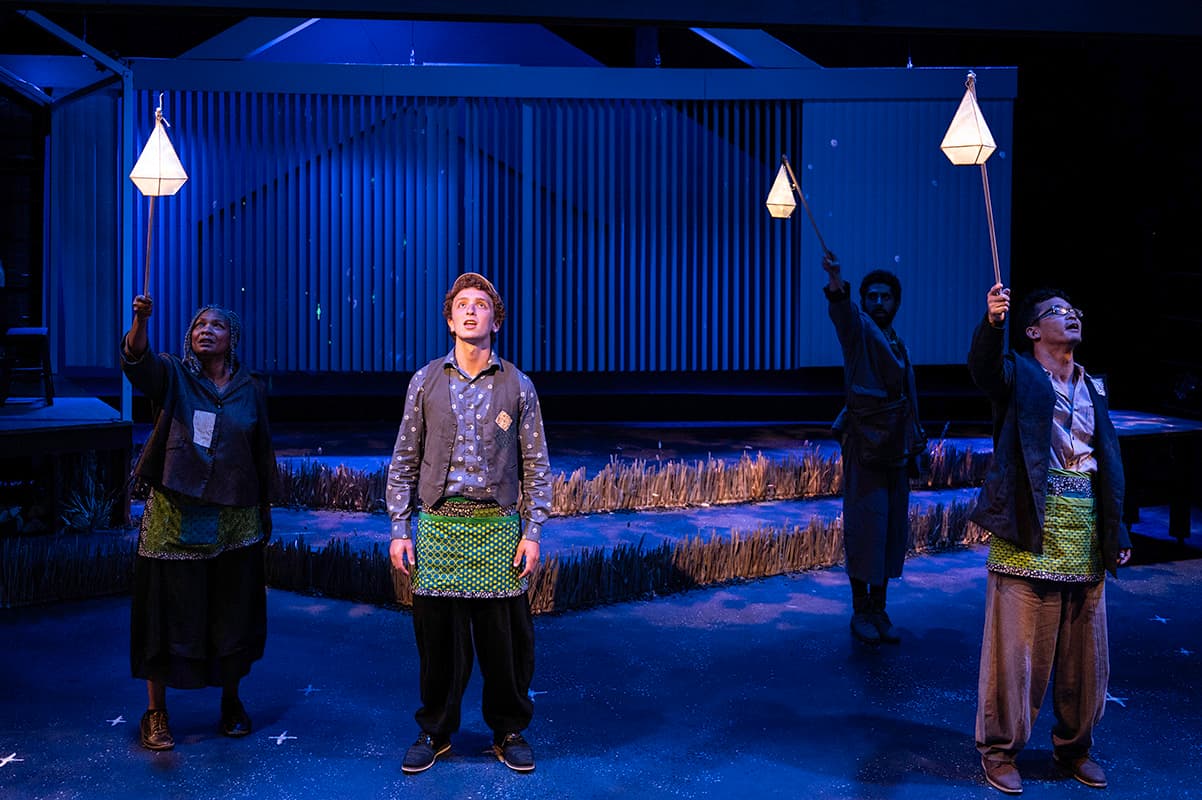‘Three Thousand Years of Longing’ Review: Wishful Thinking
Daringly different, but dramatically inert, George Miller’s 'Three Thousand Years of Longing' misfires shooting for the moon.

Following the Oscar-winning success of his action-cinema masterpiece Mad Max: Fury Road, veteran filmmaker George Miller probably could have barreled right onto directing another franchise blockbuster. (Fury Road prequel Furiosa, starring Anya Taylor-Joy, won’t arrive until 2024.)
But the writer-director of Babe and the Happy Feet films clearly charts his own path, and it’s commendable that his immediate followup to Fury Road lands miles and millennia from the expected. It’s unfortunate, though, that Three Thousand Years of Longing (★★☆☆☆) turns out to be an ambitious exercise of narrative refinement that wilts slowly in protracted scenes of two great actors talking it up in a hotel room.
A bold departure from the razor’s-edge, kinetic exuberance of previous Miller films, Longing luxuriates in thoughtful, patient storytelling that feels apropos for a fairy tale that philosophizes more eagerly than it dramatizes. It’s just that the deliberate pacing grows tedious after a while.
Adapted from A.S. Byatt’s short story “The Djinn in the Nightingale’s Eye,” the film stars Tilda Swinton as lonely Londoner, Alithea — a narratologist, naturally — who holes up inside her hotel room in Istanbul with a djinn, or genie, who offers to grant her three wishes.
The djinn pops out of a beguiling glass lamp that Alithea plucked from a pile of trinkets at a market, and appears in the even more beguiling form of a barely dressed Idris Elba. So we can totally get why she’d want to blow off her Narratology conference and just lounge around with Djinn, parleying over how best she might spend her wishes.
Since she can’t decide, he takes over the storytelling, hoping to impart insight by spinning morality tales about falling in love with Queen Sheba, or running afoul of King Solomon. The film realizes its ancient settings with lushly detailed production and costume design, and vibrant, effects-aided cinematography.
Miller transmits joy in depicting the outlandish, fantastical creatures that populate the Djinn’s tales. The historical and fantastical performances, however, mostly by unknowns and largely dialogue-free as the Djinn narrates their tales, aren’t as vibrant as the gorgeously epic imagery. Some barely meet the standard of cable-TV dramatic reenactment.
Loosely portioned into chapters, the stories of sultans and sorcerers likewise proceed in a fairly rote fashion. Alithea calls it out early on, noting that stories about wishes always turn out to be cautionary tales. In that regard, the movie doesn’t aim to surprise with its vignettes of thwarted seductions and carnal catastrophes. They are cautionary tales, as is, ultimately, Alithea’s tale, too.
All the stories, far-flung though they may be, lead back to that increasingly tedious debate humming along inside the Agatha Christie room of the Ritz-Carlton in Istanbul. As the film sensually explores the power of myth, Alithea and Djinn parry over the power of love, philosophizing on life, death, liberty, happiness, and of course, longing.
Alithea’s wishes can’t be used frivolously: the Djinn can only grant her true “heart’s desire.” Then what might this self-described “adequately happy” woman — alone by choice, she says — desire enough to risk whatever cruel fate possibly awaits her in her own cautionary tale?
She might just desire the Djinn. And the film is intellectually ambitious enough to acknowledge that, given a choice between keeping a big, Black slave who grants wishes, or granting him freedom to follow his bliss, Alithea might be inclined to put her desires before Djinn’s freedom.
The movie doesn’t have the cojones to go all-in on exploring the warped power dynamic between fair Alithea and her imprisoned servant, retreating to a wanly executed morally upright conclusion. The scintillating air of exciting possibilities dissipates in the film’s flat final act, but the disappointment isn’t total.
In fits and starts, Miller’s opus is dazzlingly imaginative and might make for an intriguing double-feature paired with Miller’s all-star cast adaptation of Witches of Eastwick, another fanciful film that stepped right up to the charged line drawn between the sexes, before hastily wrapping up in a jumble of plot noise.
Three Thousand Years of Longing is Rated R and is playing in theaters nationwide, including Landmark Theatre. Visit www.landmarktheatres.com or www.fandango.com.
Support Metro Weekly’s Journalism
These are challenging times for news organizations. And yet it’s crucial we stay active and provide vital resources and information to both our local readers and the world. So won’t you please take a moment and consider supporting Metro Weekly with a membership? For as little as $5 a month, you can help ensure Metro Weekly magazine and MetroWeekly.com remain free, viable resources as we provide the best, most diverse, culturally-resonant LGBTQ coverage in both the D.C. region and around the world. Memberships come with exclusive perks and discounts, your own personal digital delivery of each week’s magazine (and an archive), access to our Member's Lounge when it launches this fall, and exclusive members-only items like Metro Weekly Membership Mugs and Tote Bags! Check out all our membership levels here and please join us today!

























You must be logged in to post a comment.